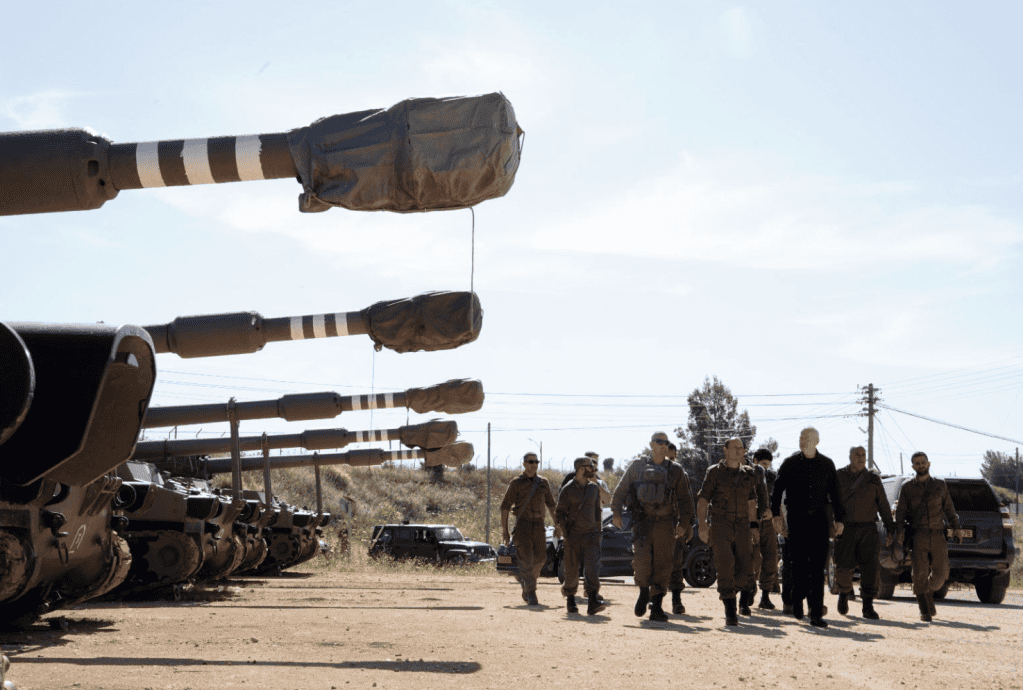
Israel’s Minister of Defense visited northern Israel on May 8 as Hezbollah continued to escalate attacks on Israel and Israel responded by striking Hezbollah sites near the border. The Minister of Defense came to the north after visiting an artillery battery on the border of Gaza on May 7, symbolizing in his schedule the challenges of fighting a conflict on two fronts.
Gallant went to the 91st division, which is tasked with protecting the Galilee. Israel has two territorial divisions in the north, the 91st and the 210th deployed in the Golan. The IDF has other divisions in the north, including reservists. The deployment began after Hezbollah began attacks on Israel on October 8, 2023, joining the Hamas war on Israel. However, the situation in the north is different than Gaza. Hezbollah carries out daily attacks using rockets, anti-tank missiles and drones. Unlike Hamas, Hezbollah’s arsenal appears relatively intact after seven months of war. Israel has kept around 50,000 residents of northern communities evacuated due to the ongoing clashes.
“I am determined to ensure the safe return of the residents of our northern communities to their homes, and to rebuild that which was destroyed. The task here is incomplete,” Gallant said. Gallant met with the 91st division’s commander, Lt. Col. Shay Klaper and toured an encampment of IDF artillery. He also went to an observation post, according to photos distributed by his office. “The defensive battle is a complex one – it is a battle in which you are constantly anticipating the enemy’s actions, while remaining alert and active. The Division is carrying out its missions in an excellent fashion – we have pushed Hezbollah to significant distances,” Gallant said.
He also vowed that Israel would return civilians to border communities. He said the military had a “duty” to prepare for an operation in the north. “I am determined to return these communities to their homes and to rebuild that which was destroyed,” he said. He warned about the possibility of a future war in the north. “War is costly and it would have a heavy cost for Israel and a catastrophic one for Hezbollah and Lebanon. We strive to make achievements without war – yet we have an obligation to our citizens.”
Gallant has warned about war in the north since the beginning of the conflict. However, the Gaza war continues to consume attention, resources and the need for regular army units. Israel has not appeared to want to enter into a two-front conflict.
Hezbollah carries out attacks daily on Israel, often claiming to focus on striking IDF positions. However, the constant attacks have also damaged a large number of homes in the north, likely more than 1,000 in seven months. On May 8, Hezbollah fired at a number of communities in the northern Galilee, including the towns of Fassuta and Alkosh. In addition, Hezbollah has increased its use of drone attacks over the last several days, ever since the IDF indicated it would proceed with the Rafah operation. This appears to be a specific type of escalation, even though the drones often threaten areas within several kilometers of the border, not penetrating deeper. There were eight rounds of sirens in different areas in northern Israel on May 8, beginning at 11am and ending around 4pm local time.
Overnight between May 7 and 8, the IDF struck Kfarkela, Ayta ash Shab, Khiam, Maroun El Ras, Houla and Aitaroun in southern Lebanon. Later in the day, the IDF expanded the strikes to include Jabal Rezlane, Odaisseh, Blida, Maroun al-Ras, and Ramyeh. In Ramyeh, the strikes were more extensive, hitting 20 terror targets, the IDF said. “During the strikes, secondary explosions were identified, indicating the presence of weapon storage facilities in the area,” the IDF added. Some towns in southern Lebanon such as Ayta ash Shab are the target of multiple strikes a day.
It is not entirely clear if the strikes are having a meaningful impact on Hezbollah. Hezbollah often announces if its members are killed, and the IDF generally says it is hitting “infrastructure.” The clashes in the north, although the escalated during the opening days of the Rafah offensive, continue to take on the proportional cycle that has been common for seven months.







